Global Archive
Free Newsletter
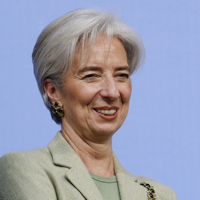
The public commentary on the International Monetary Fund’s search for a new managing director to replace Dominique Strauss-Kahn consistently stressed the need for a non-European to be selected in order to relegitimize the IMF. Now that French Finance Minister Christine Lagarde has been named to the job, one could understandably expect the fund to slide into irrelevance. Whether this is the case, however, depends less on the actual selection process and more on how Lagarde handles the day-to-day operations of the fund once she takes over. Maintaining some continuity with the fund’s Strauss-Kahn era, while breaking with it on Greece, […]
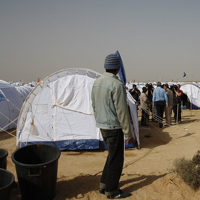
When do humanitarian crises resulting from internal conflicts merit international military intervention? Despite the formal international consensus endorsing an international “responsibility to protect,” there is very little agreement on when armed intervention in another state’s internal conflicts is justified and appropriate. Even among Western nations, where support for this concept is strongest, there is no general agreement as to what ought to trigger international intervention. The ongoing U.S. and NATO military intervention against the Libyan government has become the first test case for the responsibility to protect (R2P) doctrine since U.N. member states approved it in 2005. However, the manner […]
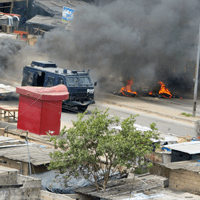
U.N. Security Council Resolution 1973 (.pdf) resulted in prompt international action that delivered Libyans from the murderous violence Moammar Gadhafi had already inflicted on civilians early in March, as well as from violence he continued to threaten against what he called, in an eerie echo of Rwanda’s murderous regime in 1994, the “cockroaches” who opposed him. Earlier, the council’s Resolution 1970 (.pdf) had unanimously approved an arms embargo, asset freeze, travel ban and reference to the International Criminal Court. In addition, the U.N. Human Rights Council unequivocally condemned Libya, which led to the General Assembly’s unprecedented decision to suspend Libyan […]
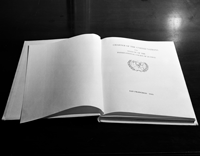
Proponents of the responsibility to protect (R2P) doctrine contend that it is necessary to reform the post-1945 United Nations noninterventionist regime in order to come to grips with armed conflicts that take place entirely inside independent countries but that produce grave human rights violations. As it stands, the U.N. regime is fundamentally restrictive, resting on a doctrine of nonintervention as set out in Article 2 of the U.N. Charter. Armed force can lawfully be employed only for two basic purposes: national defense and international peace and security. Those two elements of the U.N. justification of lawfully going to war, known […]
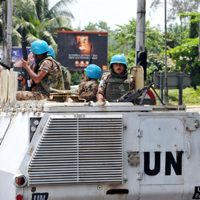
The debate over humanitarian intervention has a way of calling forth unconditional answers to a question that ought to elicit subtle reflection: What responsibilities do citizens of some or all states have to those of another state who are suffering grave harm? Realists argue that, however tragic, such situations seldom if ever touch on the fundamental interests of other powers, and thus no response is justified. Anti-imperialists maintain that most of the outside powers that have the ability to intervene cannot do so justly or disinterestedly, for reasons of history and current political economy. Purists claim that interventions are not […]

Any hopes that volatile global oil markets would settle has been dispelled by events over the past two weeks: With OPEC unable to agree on a price target at its latest meeting, the International Energy Agency (IEA) decided to release 60 million barrels of strategic reserves. As a result, markets have little idea how to set prices. A 7 percent price drop following the IEA’s actions suggests that the market is trending downward. But while lower prices will be welcome news to consuming countries, the IEA is playing a dangerous game in seeking to influence short-term sentiment by putting more […]
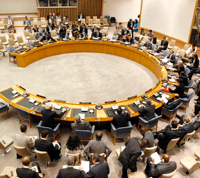
Despite all the favorable rhetoric regarding the responsibility to protect, governments continue to hesitate to embrace wholeheartedly the doctrine whereby, in the event a state is unable or unwilling to prevent its citizens from dying in large numbers, other states must be prepared to intervene. Governments from around the world endorsed this concept in the abstract at the September 2005 World Summit, but have been reluctant to apply it in reality. Indeed, Paragraph 139 of the World Summit Outcome document hedges, noting that application of the principle will be undertaken “on a case-by-case basis.” Some experts, however, have argued that […]
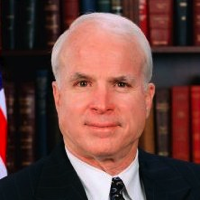
Sen. John McCain is worried about the direction of U.S. foreign policy, especially within his own party. Some Republican presidential contenders have questioned the nation-building mission in Afghanistan. Others point out that the undeclared war in Libya is neither necessary nor constitutional. “This is isolationism,” an aghast McCain declared on the ABC News program “This Week.” Isolationism? The term “isolationist” is little more than a slur. It essentially means someone who thinks the U.S. should engage in fewer foreign wars than the speaker does. The term emerged in the late-19th century, when it was made popular by the ardent militarist […]
Earlier this month, the U.S. Navy forced the M/V Light, a Belize-flagged North Korean vessel en route to Myanmar, to return home, invoking the Proliferation Security Initiative (PSI), an effort to stop trafficking in nuclear materials. In an email interview, Mark J. Valencia, a senior associate at the Nautilus Institute, discussed the operations and effectiveness of the PSI. WPR: Briefly, how does the Proliferation Security Initiative operate? Mark J. Valencia: The PSI does not create a new legal framework; rather, it uses existing national authorities and international law to achieve its goals. Initially, 11 nations signed on to the “Statement […]
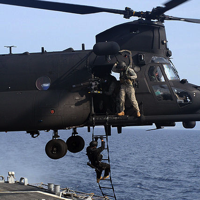
A month after the mission that killed Osama Bin Laden, defense analysts are pointing to a growing collaboration between conventional and irregular forces and are calling for a lighter global military footprint, one based on raiding and strike capability rather than ponderous presence. The newfound enthusiasm for “collaborative warfare” is reviving a concept once thought dead: network-centric warfare (NWC). Paradoxically, NWC has proved itself well-suited to low-intensity operations and the culture of special operations forces, where once it was commonly associated with high-intensity conflict against a peer competitor. But NWC’s low-intensity revival also suggests that it will continue to face […]

With oil prices nearing $120 a barrel and Libyan exports shut down, all eyes were on the 12 members of the Organization of Petroleum Exporting Countries (OPEC) during their meeting in Vienna earlier this month. The International Energy Agency (IEA) had strongly urged OPEC, which produces 40 percent of the world’s oil and holds much of the spare capacity, to raise production output to stem rocketing oil prices and prevent a potential double-dip recession. That did not happen. In what Saudi Oil Minister Ali al-Naimi labeled one of the worst meetings he had attended, the proposal by Saudi Arabia, Kuwait, […]

It is tempting to view the Obama administration’s new cyber strategy as the creation of yet another “conflict domain” to worry about in U.S. national security. Thus, in our enduring habit of piling new fears on top of old ones — nuclear proliferation, terror, rising powers and failed states, among others — we imagine yet another vulnerability/threat/enemy to address with buckets of money. In truth, the strategy document is just our government finally acknowledging that, as usual, any fruitful international dialogue on this subject awaits the first move by the system’s most advanced military power. The same stalemate exists in […]
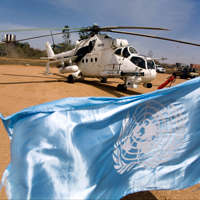
The announcement this week by India that it would be withdrawing its four remaining attack helicopters from the United Nations peacekeeping mission in the Democratic Republic of the Congo highlighted a long-simmering problem: The U.N. is desperate for more military helicopters. According to Alain LeRoy, the U.N. undersecretary-general for peacekeeping, military helicopters are badly needed for peacekeeping missions, particularly in Africa. While the shortage is serious and severely limits the U.N.’s ability to successful implement its mandates, there are several straightforward changes that the U.N. can make to its policies and procedures that would make contributing the needed helicopters more […]
The purchase and sale of carbon credits are relatively new concepts in Africa, accounting for less than three percent of the $144 billion global carbon credit trade. The system is designed to reduce carbon emissions worldwide by allowing projects that that produce low carbon emissions to sell credits to projects that want to reduce their carbon emissions under the Kyoto Protocol.
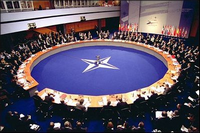
A constant refrain of the Democratic party’s foreign policy establishment during the administration of former President George W. Bush was that, in contrast to “unilateralist” Republicans with their cosmetic “coalitions of the willing,” Democrats were more skilled at constructing durable international partnerships that would lead to true burden-sharing. The assertion, which became almost an article of faith, served as the basis for John Kerry’s 2004 campaign promise that, if elected, he would be able to secure broader multilateral troop contributions in Iraq to relieve the burden on U.S. troops there. In the 2008 election, the same faith, combined with a […]
